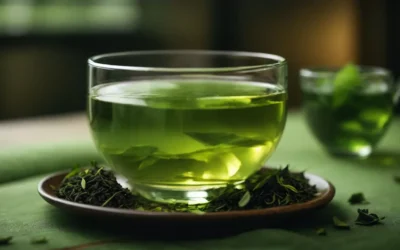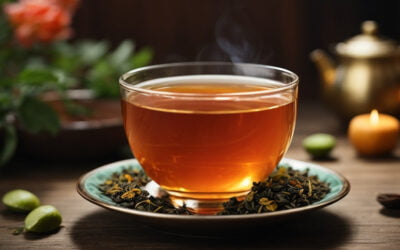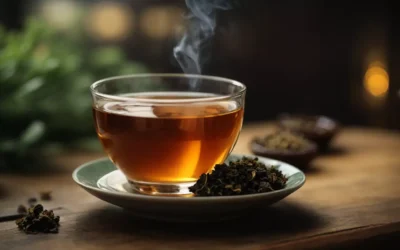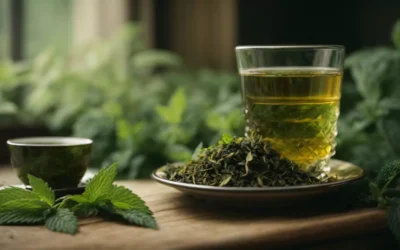Ginger tea, a beloved herbal drink with a long-standing history, has captivated palates for centuries. This spice-infused beverage is a delightful addition to any collection of recipes. Renowned for its unique flavor and enticing aroma, this article delves into the multitude of health benefits of ginger tea. Ginger, a spice, has beneficial effects on health. Its versatile uses include making herbal tea with fresh mint leaves.
Research suggests that ginger tea recipes can aid in digestion, providing therapeutic compounds and relief from various gastrointestinal conditions. Additionally, this drink has minimal side effects. Studies have shown that drinking ginger tea can help stimulate digestion and alleviate discomfort.
Ginger tea recipes are a popular choice for those looking to incorporate natural remedies into their study routine. Additionally, ginger tea is a healthier alternative to sugary drinks. It is a popular drink enjoyed for its soothing properties and is commonly used as a home remedy for nausea and morning sickness. Many people find it helpful when studying or needing to focus. Check out these ginger tea recipes!
Whether you prefer to drink ginger tea by steeping fresh ginger pieces in hot water or using pre-packaged tea bags, this refreshing drink provides a convenient way to enjoy its nutrition-packed goodness. Ginger tea recipes are popular among those who study its benefits. Some people even love adding milk or honey to their fresh ginger tea or lemon ginger tea, made with tea leaves, to enhance the taste further.
- Discovering Ginger Tea
- Health Benefits of Ginger Tea
- Nausea and Motion Sickness Relief
- Ginger Tea and Heart Health
- Weight Management with Ginger Tea
- Anti-inflammatory and Pain Relief Benefits
- Preparing Your Perfect Cup of Ginger Tea
- Ginger Tea Variations and Recipes
- Side Effects and Precautions of Ginger Tea
- Other Healthy Tea Alternatives
- Conclusion
- Frequently Asked Questions
Discovering Ginger Tea
Ginger tea is a popular drink made from the root of the ginger plant, known as Zingiber officinale. This recipe is a great way to enjoy the study benefits of ginger. This aromatic and spicy ginger root, known for its medicinal properties, has been used for centuries in Asia. Whether in the form of ginger extract, tea leaves, fresh ginger tea, or ginger powder, it continues to be a popular choice for herbal remedies. Today, ginger tea is enjoyed worldwide for its therapeutic properties. A recent study has shown that ginger tea has numerous health benefits.
Ancient Medicinal Herb
The use of ginger as a medicinal herb dates back to ancient times in Asia. Ginger extract has long been highly valued for its ability to alleviate various ailments and promote overall well-being. Whether enjoyed as fresh ginger tea or lemon ginger tea, its benefits are widely recognized. In traditional Chinese medicine and Ayurveda, ginger was considered a powerful remedy for digestive issues, such as nausea, indigestion, and bloating. Its anti-inflammatory properties were also recognized and utilized to relieve pain and inflammation. Ginger extract was particularly effective in this regard. Additionally, lemon ginger tea has also been found to have similar benefits.
Therapeutic Properties
Drinking ginger tea can offer numerous health benefits due to its natural compounds. Fresh ginger contains bioactive compounds like gingerol, which has antioxidant and anti-inflammatory effects on the body. These properties make lemon ginger tea useful in reducing muscle soreness after exercise or relieving joint pain associated with conditions like arthritis.
Moreover, ginger tea is often consumed to alleviate digestive discomforts like upset stomachs or morning sickness during pregnancy. The warm infusion of fresh ginger root helps stimulate digestion by increasing the production of digestive enzymes and improving nutrient absorption.
Lemon Ginger Tea
One popular variation of ginger tea is lemon ginger tea. By adding freshly squeezed lemon juice to the brew, you not only enhance the flavor but also boost its nutritional value. Lemons are rich in vitamin C, which strengthens the immune system and promotes collagen production for healthy skin.
The combination of lemon and ginger creates a refreshing beverage that can be enjoyed hot or cold throughout the year. Lemon’s tangy taste complements the spiciness of fresh ginger beautifully, resulting in a delightful balance of flavors.
Enhancing Absorption with Black Pepper
To maximize the absorption of beneficial compounds from ginger tea, some people add a pinch of black pepper. Black pepper contains a compound called piperine, which enhances the bioavailability of certain nutrients in the body. When combined with ginger, black pepper can potentially improve the absorption of gingerol and other beneficial compounds.
Adding freshly ground black pepper to your ginger tea not only adds a hint of spiciness but also provides potential health benefits through increased nutrient absorption.
Health Benefits of Ginger Tea
Ginger tea is not only a delicious and soothing beverage, but it also offers numerous health benefits. Let’s explore some of the ways that ginger tea can positively impact your well-being.
Powerful Antioxidants to Combat Oxidative Stress
Ginger tea contains powerful antioxidants that play a crucial role in protecting our bodies against oxidative stress. These antioxidants help neutralize harmful free radicals, which are unstable molecules that can damage cells and contribute to various chronic diseases. By incorporating ginger tea into your daily routine, you can provide your body with an extra boost of antioxidants to promote overall health and well-being.
Boosts Immune System Function
Regular consumption of ginger tea may help strengthen the immune system. The immune system plays a vital role in defending the body against harmful pathogens and viruses. Ginger has been found to possess antimicrobial properties that can help fight off infections and support immune system function. By enjoying a cup of ginger tea regularly, you can give your immune system the support it needs to stay strong and healthy.
Potential Anti-Cancer Effects
The bioactive compounds found in ginger have been linked to potential anti-cancer effects. Research suggests that certain components in ginger, such as gingerol and 6-gingerol, may inhibit the growth of cancer cells and even induce cell death in some cases. While more studies are needed to fully understand the extent of these effects, incorporating ginger tea into your diet may offer additional protection against certain types of cancer.
Aids Digestion
Ginger has long been used as a natural remedy for digestive issues such as nausea, indigestion, and bloating. Ginger tea can help stimulate digestion by increasing the production of digestive enzymes and improving nutrient absorption. It may also alleviate symptoms associated with gastrointestinal disorders like irritable bowel syndrome (IBS). Sipping on a warm cup of ginger tea after meals can aid digestion and soothe any discomfort you may be experiencing.
Manages Blood Sugar Levels
Research suggests that ginger extract and ginger tea may help regulate blood sugar levels. The active compounds in ginger can enhance insulin sensitivity, which is crucial for maintaining stable blood sugar levels. By incorporating ginger tea into a balanced diet, individuals with diabetes or those at risk of developing the condition may potentially benefit from its blood sugar-regulating properties.
Incorporating ginger tea into your daily routine can provide a range of health benefits, from boosting your immune system to aiding digestion and potentially even reducing the risk of certain cancers. So why not brew yourself a warm cup of ginger tea and enjoy both its delicious taste and its positive impact on your well-being?
Nausea and Motion Sickness Relief
Ginger tea has been used for centuries as a natural remedy for various ailments, including nausea and motion sickness. The active compounds found in ginger can provide relief from symptoms such as dizziness, upset stomachs, and vomiting.
Alleviating Symptoms of Nausea and Motion Sickness
The powerful properties of ginger make it an effective solution for those who suffer from motion sickness or experience bouts of nausea. The active compounds, such as gingerol and shogaol, have anti-inflammatory and antioxidant effects that can help ease the discomfort caused by these conditions.
Soothing Relief during Travel or Morning Sickness
For individuals prone to motion sickness during travel, sipping on a cup of warm ginger tea can provide soothing relief. Ginger helps to calm the stomach and reduce feelings of nausea, making it an excellent companion for long car rides or boat trips.
Moreover, pregnant women experiencing morning sickness may find comfort in drinking ginger tea. It is a gentle yet effective remedy that can alleviate the queasiness associated with early pregnancy. However, it is always advisable to consult with a healthcare professional before incorporating any new remedies into your routine during pregnancy.
A Natural Remedy from Folk Medicine
Ginger has been utilized in traditional folk medicine across various cultures for its medicinal properties. Its use as a remedy for indigestion, upset stomachs, and vomiting dates back centuries. Many people rely on the soothing effects of ginger tea to relieve gastrointestinal discomfort naturally.
How to Make Ginger Tea
Making ginger tea at home is simple. Start by peeling fresh ginger root and slicing it into thin pieces. Bring water to a boil in a saucepan or kettle and add the sliced ginger. Allow it to simmer on low heat for about 10-15 minutes to extract the flavors fully. You can sweeten the tea with honey or add lemon juice for added taste if desired. Strain the tea and enjoy it warm.
Ginger Tea and Heart Health
Ginger tea has been found to have potential benefits for heart health. Studies suggest that regular consumption of ginger tea may help lower blood pressure levels, which is a key factor in maintaining a healthy heart. The anti-inflammatory properties of ginger can also contribute to improved cardiovascular health.
Drinking ginger tea has been associated with reduced risk factors for heart disease and stroke. High blood pressure is a major risk factor for these conditions, and the ability of ginger tea to lower blood pressure levels makes it an appealing addition to a heart-healthy lifestyle.
The anti-inflammatory properties of ginger are believed to play a role in its beneficial effects on the cardiovascular system. Chronic inflammation can damage blood vessels and increase the risk of heart disease. By reducing inflammation, ginger tea may help protect against these negative effects and promote better heart health.
In addition to its potential impact on blood pressure and inflammation, ginger tea may also have other positive effects on heart health. For example, some research suggests that it may help regulate cholesterol levels by lowering LDL (bad) cholesterol while increasing HDL (good) cholesterol. Maintaining healthy cholesterol levels is crucial for preventing plaque buildup in arteries and reducing the risk of heart disease.
Furthermore, ginger tea contains antioxidants that can help combat oxidative stress in the body. Oxidative stress is known to contribute to various chronic diseases, including heart disease. By neutralizing harmful free radicals, antioxidants in ginger tea may provide further protection against cardiovascular damage.
It’s important to note that while there is promising evidence regarding the potential benefits of ginger tea for heart health, more research is needed to fully understand its mechanisms and effectiveness. As with any dietary intervention or supplement, it’s always advisable to consult with a healthcare professional before making significant changes.
To incorporate more ginger into your diet, consider enjoying a cup of warm ginger tea regularly. You can make it by steeping fresh or dried ginger root in hot water for several minutes. For added flavor, you can also add a squeeze of lemon or a drizzle of honey.
Weight Management with Ginger Tea
Ginger tea is not only a delicious and soothing beverage but also has the potential to aid in weight management. By incorporating ginger tea into your daily routine, you may be able to boost your metabolism and reduce your appetite, supporting healthy weight loss.
Boosting Metabolism and Reducing Appetite
Drinking ginger tea can have a positive impact on your weight management journey. Ginger contains certain compounds that are known to increase thermogenesis in the body. This means that it can help to raise your body temperature, thus boosting your metabolism and increasing calorie burning.
Ginger has been found to have appetite-suppressing effects. Consuming ginger tea before meals may help you feel fuller for longer periods, reducing the tendency to overeat or snack between meals. By curbing excessive hunger pangs, ginger tea can support you in maintaining a balanced diet and managing your overall calorie intake.
Thermogenic Properties of Ginger
The thermogenic properties of ginger make it particularly beneficial for weight management. When you consume ginger tea, the active compounds in ginger stimulate the production of heat within your body. This process requires energy expenditure, which helps burn calories and promote fat loss.
Studies have shown that consuming ginger powder as a supplement can lead to significant reductions in body weight and waist-to-hip ratio. These findings suggest that incorporating ginger tea into a balanced diet could potentially contribute to healthy weight loss efforts.
Supporting Healthy Weight Loss
While drinking ginger tea alone is unlikely to result in substantial weight loss, it can be a helpful addition to an overall healthy lifestyle. To achieve sustainable results, it’s important to combine regular consumption of ginger tea with other key factors such as a well-balanced diet and regular exercise.
A nutritious diet rich in fruits, vegetables, lean proteins, whole grains, and healthy fats should form the foundation of any weight loss plan. Regular physical activity is also crucial for burning calories and maintaining muscle mass. When combined with ginger tea, these lifestyle factors can work synergistically to support your weight management goals.
Incorporating ginger tea into your daily routine can be as simple as brewing a cup in the morning or sipping on it throughout the day. However, it’s important to note that individual results may vary, and it’s always recommended to consult with a healthcare professional before making any significant changes to your diet or exercise regimen.
Anti-inflammatory and Pain Relief Benefits
Ginger tea is not only a flavorful beverage but also offers potential health benefits. One of its key advantages lies in its anti-inflammatory properties, which can help alleviate pain caused by inflammation.
The therapeutic compounds found in ginger possess potent anti-inflammatory effects that can be beneficial for individuals experiencing various forms of pain. For instance, ginger’s analgesic properties make it an effective natural remedy for headaches, menstrual cramps, and muscle soreness. By reducing inflammation in the body, ginger tea may provide soothing relief from these discomforts.
Moreover, regular consumption of ginger tea has been linked to potential relief from chronic pain conditions such as arthritis. Arthritis is characterized by joint inflammation and can cause significant discomfort and reduced mobility. The anti-inflammatory compounds present in ginger are believed to help alleviate the symptoms associated with arthritis by reducing inflammation and providing pain relief.
In addition to its anti-inflammatory effects, ginger also possesses antioxidant properties that contribute to its pain-relieving benefits. Antioxidants help protect the body against oxidative stress caused by harmful free radicals. By neutralizing these free radicals, ginger’s antioxidant compounds may play a role in reducing pain and inflammation.
While more research is needed to fully understand the mechanisms behind ginger’s therapeutic effects on pain relief and inflammation, preliminary studies have shown promising results. For example, a study published in the Journal of Medicinal Food found that participants who consumed ginger experienced a significant reduction in muscle soreness after engaging in strenuous exercise compared to those who did not consume ginger.
Furthermore, another study published in Phytotherapy Research demonstrated that individuals with osteoarthritis experienced reduced knee pain and improved physical function after consuming a combination of ginger extract and cinnamon extract.
It is important to note that while ginger tea may offer potential health benefits for managing pain and inflammation, it should not replace medical advice or treatment prescribed by healthcare professionals. It is always advisable to consult with a healthcare provider before incorporating any new remedies or supplements into your routine, especially if you have underlying health conditions or are taking medications.
Preparing Your Perfect Cup of Ginger Tea
Steeping Fresh Ginger Slices for a Soothing Cup
To make a delicious cup of ginger tea, start by steeping fresh ginger slices in hot water for about 10 minutes. Begin by peeling and thinly slicing the ginger root. Then, bring a pot of water to a boil and add the ginger slices. Allow them to simmer in the boiling water for approximately 10 minutes. This process will infuse the water with the warm and spicy flavors of ginger.
Enhancing Flavor with Honey or Lemon
Once you’ve steeped your ginger slices, you can enhance the flavor of your tea by adding honey or lemon. Honey adds a touch of sweetness that balances out the spiciness of the ginger, while lemon provides a refreshing citrusy twist. Simply squeeze some fresh lemon juice into your cup of tea or drizzle in some honey according to your taste preferences.
Experimenting with Different Brewing Methods and Ingredients
Ginger tea offers endless possibilities for experimentation. You can try using grated ginger instead of sliced for a stronger flavor profile. You can incorporate other ingredients like cinnamon or fresh mint leaves to add depth and complexity to your tea. Some people even enjoy brewing their ginger tea with black or green tea leaves for an extra kick.
Finding Your Preferred Taste
Everyone’s taste preferences are unique, so don’t be afraid to experiment until you find your perfect cup of ginger tea. Adjust the amount of ginger, honey, or lemon based on how spicy, sweet, or tangy you prefer it to be. You may also want to explore different brewing times; steeping longer will intensify the flavors while shorter steeping times will result in milder tasting tea.
Enjoying Your Soothing Cup
Once you have found your preferred combination of ingredients and brewing method, sit back and savor every sip of your soothing cup of ginger tea. Ginger tea is a popular choice for those looking for a warm and comforting beverage, especially during colder months or when feeling under the weather. It’s not only delicious but also offers potential health benefits due to ginger’s anti-inflammatory properties.
Ginger Tea Variations and Recipes
Explore Different Flavors
Enhance your ginger tea experience by exploring various flavor combinations. You can experiment with different ingredients to create unique variations that suit your taste preferences. For instance, adding a touch of cinnamon to your ginger tea can impart a warm and comforting flavor. The combination of ginger and cinnamon creates a delightful balance of spiciness and sweetness.
Turmeric Infusion
Another way to elevate your ginger tea is by incorporating turmeric into the mix. Turmeric not only adds vibrant color but also brings its own set of health benefits to the table. This golden spice is known for its anti-inflammatory properties and may help boost immunity. Simply grate some fresh turmeric root or add a sprinkle of powdered turmeric to your ginger tea for an invigorating twist.
Minty Freshness
If you enjoy refreshing flavors, consider adding mint leaves to your ginger tea. The coolness of mint complements the warmth of ginger, creating a rejuvenating blend. Mint is known for its ability to aid digestion and provide relief from nausea, making it an excellent addition to your cup of tea.
Iced Ginger Tea Recipe
When the weather calls for something chilled, try making iced ginger tea. Brew a pot of ginger tea as usual, then allow it to cool completely before refrigerating it. Once chilled, pour the brewed ginger tea over ice cubes in a glass and garnish with a slice of lemon or sprig of mint for added freshness. Sip on this revitalizing beverage on hot summer days or whenever you crave a cooling drink.
Grated Ginger in Herbal Blends
Expand your herbal repertoire by incorporating grated ginger into other herbal blends. Combining grated ginger with herbs like chamomile or lemongrass can yield interesting flavor profiles that are both soothing and invigorating at the same time. Experimenting with different combinations will allow you to discover unique tea blends that suit your taste and offer a range of health benefits.
Side Effects and Precautions of Ginger Tea
Ginger tea is generally considered safe for consumption, but it’s important to be aware of potential side effects and take necessary precautions. While ginger tea offers numerous health benefits, excessive consumption may lead to digestive discomfort. Some individuals may experience symptoms such as heartburn, bloating, or stomach upset when consuming large amounts of ginger tea.
If you are taking blood-thinning medications, it is crucial to consult with your healthcare provider before consuming significant quantities of ginger tea. Ginger has natural antiplatelet properties that can potentially interact with these medications and increase the risk of bleeding. Your healthcare provider will be able to advise you on the appropriate intake of ginger tea based on your specific medical condition and medication regimen.
Pregnant women should also exercise caution when consuming ginger tea. While small amounts are generally considered safe during pregnancy, it is advisable to seek medical advice regarding the appropriate intake. Ginger has been traditionally used to alleviate nausea and morning sickness in pregnant women; however, high doses may have adverse effects on pregnancy outcomes. It’s always best to consult with a healthcare professional who can provide personalized guidance based on your individual circumstances.
In addition to these precautions, it’s worth noting that some people may be allergic or sensitive to ginger. If you experience any allergic reactions such as hives, itching, swelling, or difficulty breathing after consuming ginger tea, discontinue use immediately and seek medical attention.
When incorporating ginger tea into your diet, moderation is key. It’s recommended to start with small amounts and gradually increase the quantity if well-tolerated. As with any herbal remedy or dietary supplement, it’s essential to listen to your body and adjust accordingly.
To summarize:
- Excessive consumption of ginger tea may cause digestive discomfort such as heartburn or bloating.
- Individuals taking blood-thinning medications should consult their healthcare provider before consuming large amounts of ginger tea.
- Pregnant women should seek medical advice regarding the appropriate intake of ginger tea during pregnancy.
- Allergic reactions to ginger tea are possible, and if experienced, immediate medical attention should be sought.
By being aware of these side effects and taking necessary precautions, you can enjoy the benefits of ginger tea while minimizing any potential risks. As always, it’s best to consult with a healthcare professional for personalized advice based on your specific circumstances.
Other Healthy Tea Alternatives
When it comes to healthy tea alternatives, there are plenty of options to choose from. Each type of tea offers its own unique benefits and flavors. Let’s explore some popular alternatives to ginger tea:
Tea Type | Features | Pros | Cons |
|---|---|---|---|
|
| May cause allergic reactions in some individuals | |
|
| Contains caffeine, which may cause sleep disturbances | |
|
| Not recommended for individuals with acid reflux | |
|
| May interact with certain medications | |
|
| May cause allergic reactions in some individuals | |
|
| May lower blood pressure | |
|
| Not recommended for individuals with pollen allergies | |
|
| Contains caffeine, which may cause sleep disturbances | |
|
| May interfere with iron absorption | |
|
| May cause allergic reactions in some individuals |
As you can see, each tea alternative offers its own unique set of features, pros, and cons.
Conclusion
In conclusion, ginger tea offers a myriad of health benefits that make it a valuable addition to your daily routine. From relieving nausea and motion sickness to promoting heart health and aiding in weight management, the properties of ginger tea have been shown to have a positive impact on various aspects of well-being. Its anti-inflammatory and pain-relieving effects make it a natural remedy for those seeking relief from discomfort.
To fully enjoy the benefits of ginger tea, it is important to prepare it correctly. Follow the simple steps outlined in this article to ensure that you brew the perfect cup every time. Experiment with different variations and recipes to find the flavor profile that suits your taste preferences.
Incorporating ginger tea into your daily routine can be a small yet powerful step towards better health. So why not give it a try? Start reaping the benefits today by adding ginger tea to your shopping list and experiencing its remarkable effects for yourself.
Frequently Asked Questions
Can ginger tea help with digestion?
Yes, ginger tea can aid in digestion by stimulating the production of digestive enzymes and improving overall gut health. It helps to alleviate symptoms such as bloating, indigestion, and nausea.
Is ginger tea effective for relieving menstrual cramps?
Yes, ginger tea has been found to have anti-inflammatory properties that can help reduce the severity of menstrual cramps. It can also help relax the muscles in the uterus, providing relief from pain and discomfort.
Does ginger tea boost the immune system?
Yes, ginger tea contains antioxidants and antimicrobial compounds that can strengthen the immune system. Regular consumption of ginger tea may help prevent common illnesses like colds and flu by enhancing immunity.
Can ginger tea help with weight loss?
Ginger tea may aid in weight loss by boosting metabolism, promoting fat burning, and reducing appetite. However, it is important to note that it should be incorporated into a balanced diet and active lifestyle for optimal results.
Is it safe to drink ginger tea during pregnancy?
While moderate consumption of ginger tea is generally considered safe during pregnancy, it is advisable to consult with a healthcare professional before doing so. Some studies suggest that excessive amounts of ginger may increase the risk of complications during pregnancy.











